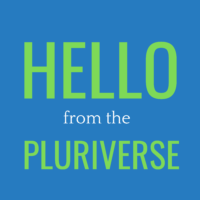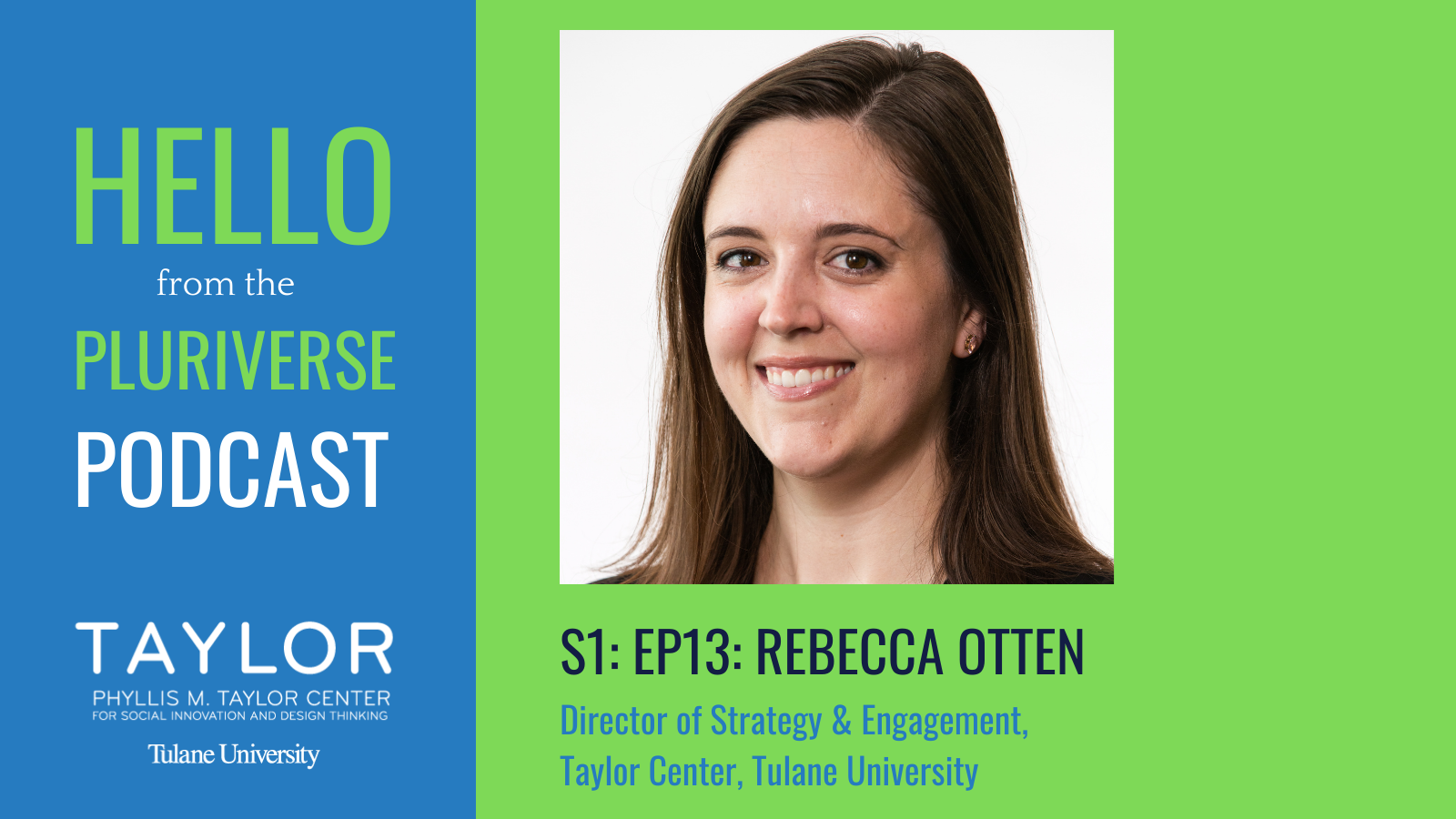“Whatever the thing is, it doesn’t have to be perfect.”
Rebecca Otten is a Professor of Practice and the Director of Strategy & Engagement at the Taylor Center. She facilitates the Taylor Center’s field leadership, campus and community partnerships, and program assessment. She also teaches “Introduction to Social Innovation and Social Entrepreneurship” as well as “Cultivate your Inner Changemaker” and works with GrowDat Youth Farms, a local organization that nurtures a diverse group of young leaders through the meaningful work of growing food.
Connect with Rebecca:
Pluriverse Publication Chapter: Rebecca Otten
Written by Ruby Murfield and Edited by Natalie Hudanick.
Download a PDF Layout of the Rebecca Otten chapter in the Pluriverse Publication.
Rebecca Otten entered Tulane University in 2005, just as Hurricane Katrina forced the University to close for the semester, and then she graduated in 2009, in the midst of the Great Recession. This prompted her to stay in New Orleans and work with the newly minted Phyllis M. Taylor Center for Social Innovation and Design Thinking. Rebecca’s work has spanned from student leadership teams to undergraduate programming, to teaching and running the Social Innovation and Social Entrepreneurship (SISE) minor. Because she is not formally trained in design thinking, everything she has learned has been informal and through her colleagues at the Taylor Center, showing the collaborative nature of design. Rebecca is now the Director of the Taylor Center’s SISE minor. She believes the program as a minor is invaluable but from the beginning knew it would not work well as a major since SISE is a way of solving problems in the students’ different fields. For Rebecca, SISE is not meant to be a standalone major, it is ultimately a lens that a student is meant to add on to their own discipline. While the minor and Rebecca are focused on the social innovation side of Taylor, this approach fits well with Design Thinking and a design mindset.
Rebecca’s own discipline is public health, in which she holds a Master of Public Health, and has been the perfect field to use a design mindset. Within her discipline, applying a design mindset has made her look at how the system levels, like institutional, environmental, societal, etc., have an impact on health and well-being. Rebecca sees design thinking, not as a linear process, but rather as a set of habits and mindsets that can be incorporated in day-to-day life, so when she is using design thinking, she takes some of these mindsets or methods and then applies them to her own work. A design thinking mindset has taught Rebecca the art of asking “good” questions and how to reframe your thinking around the questions themselves. When Rebecca uses a design thinking mindset, her goal is not perfection, instead it is about making many iterations of a product/project and then just getting what she is working on out there in front of people. Focusing on getting your project or product in front of people is something Rebecca has been trying to work on while focusing less on making sure it’s perfect before someone sees it.
In creating and cultivating collaborative partnerships, Rebecca has worked to use design thinking mindsets to help local leadership programs maintain sustainability for the future. This has included her work with Grow Dat Youth Farm, a New Orleans organization that works to nurture leadership in local young people through growing food. As part of this organization, local high schoolers who are in the program lead Tulane undergraduate students on projects, helping to nurture that leadership in young people by building a sense of confidence and efficacy in them. Grow Dat uses a five modules of visions multiculturism curriculum that works to increase empathy among those in the program and Tulane students themselves as they participate in their service-learning, so that they can better understand Grow Dat’s purpose and the young people in the program. Rebecca believes that design and systems thinking could be used as a tool for young people, in particular those in K through 12 education. Design and systems thinking can prepare young students for higher education and for opportunities outside of school in its own unique way. Using design and systems thinking can be transformational, just like the work the Grow Dat Youth Farm does.
The advice that Rebecca has for students or non-designers is that you should continue to always have a critical view on what you see or are creating. While social innovation can be optimistic and hopeful, it goes much deeper that, and should not be the go-to model just because it may resonate best with whatever project you may be working on. Ultimately, social innovation is a young field, and so many people are defining it differently, but is also varies from country to country. As Rebecca as shown throughout her work, there is no one way to use design and social innovation.
- Instagram: @hellopluriverse
- Twitter: @hellopluriverse
- Email: taylor@tulane.edu
- Subscribe to our newsletter
The Hello from the Pluriverse Podcast aims to open up and create a space to have conservations about the pluriversality in design.
This podcast is a project of the Design Thinking for Social Innovation Program at the Phyllis M. Taylor Center for Social Innovation and Design Thinking at Tulane University.
Executive Producer: Lesley-Ann Noel, Ph.D
Sound editing
- Max Esperance
- Lavonte Lucas: xn--vonni-fsa.com, Instagram: @vonnieradass, Twitter: @vonnieradass
Hello from the Pluriverse 2020-2021 Student Team
- Max Esperance – Podcast lead
- Natalie Hudanick and Michaeline Anglemire – Editors
- Tiwani Oseni – Communications
Hello from the Pluriverse 2019-2020 Student Team

